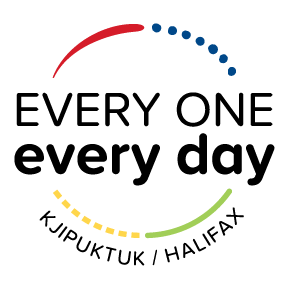Meet ‘Kokum’, Our Approach to Truth and Reconciliation
A Reconciliation Framework for ‘Every Day’ Action
By Tammy Mudge, Manager, Learning & Evaluation at Every One Every Day
Kokum translates to “big old tree” in Mi’kmaw. The large tree image (45x72 inches) is used as a planning resource and an interactive tool to assist our team with implementing and evaluating actions that we take towards Truth and Reconciliation. It also helps to keep us accountable to one another, to the community, and to our First Nation, Metis, and Inuit kin. It is located at our Neighbourhood Shop, and we invite you to stop by and see it for yourself and start a conversation!
Questions we considered as we moved through the process of developing this framework:
How does EOED define and interpret Active Reconciliation?
Where will we get information & find support?
How will we know if our actions are having an impact?
How does EOED define and interpret Active Reconciliation?
Raising awareness about the impacts of colonization in “Canada”.
Disrupting oppressive and inequitable spaces and processes that show up in our daily lives through meaningful actions and active allyship.
Reclaiming individual and collective identity, not just of First Nation, Metis, and Inuit Peoples, but of everyone.
Restoring harmony with nature.
Reviving and reclaiming treaty relationships.
Acknowledging and valuing Indigenous knowledge systems.
Breaking Down the Framework
The Ecosystem: Nurturing the Framework
Niskam (Spirit)
Acknowledging the Presence of our Ancestors
In Mi’kmaw culture, we acknowledge our shadow as the spirit of our ancestors. We are linked to our ancestors, where Grandfather Sun meets Mother Earth. Our shadow is connected to the spiritual world and the physical world. One foot in the world of our ancestors and one foot looking to the future. When we honour our ancestors, we honour ourselves.
Samqwan (Aquifer)
Sustenance for Being of Good Mind
Many Indigenous cultures make space for healing using ceremonies with water and sacred medicines which nourish and replenish the mind, body, and spirit. The Aquifer provides sustenance and healing to Kokum.
Maqmikew (Land)
Surrounding Networks and Shared Resources
The land and natural elements surrounding Kokum extend to the deepest parts of the forest, sharing and interconnecting the abundance of unique gifts and understanding they possess with Kokum and all those they encounter. Respectful relations rooted in reciprocity and shared understanding provide Kokum with the support needed to continue to make an impact.
Naku’set (Sun)
Surfacing Truth
From sunrise to sunset, the sun shines fissures of light onto Kokum, forever seeking truth- asking questions, and discovering and revealing the unseen. The sun urges Kokum to stretch farther and encourages Kokum to never stop growing.
Mnqwan (Rainbow)
Hope & Aspirations for our Youth
The rainbow is brilliant and beautiful as it confidently stretches across the sky overhead, never-ending. The rainbow represents the path of the next seven generations and demonstrates the hope and aspirations for our youth that Kokum possesses.
Parts of the Tree: Components of the Framework
Wjipiskl (Roots)
Sharing Knowledge as a Sacred Gift through the Generations
The roots of Kokum are strong! They are the knowledge carriers and living wisdom that care for and pass on sacred and traditional ways of life. They are our Elders & traditional teachers, singers & dancers, crafters & storytellers, Warriors, Water Protectors & Land Defenders, and our harvesters, hunters, fishers and trappers. The roots provide Kokum with the cultural richness and traditional knowledge and understanding needed to stand strong and unwavering in her efforts, always knowing why she was created and where she sprouted from.
“Weji-sqalia’timk, where we sprouted or emerged from”
Jokom (Base of the Tree)
Guideposts to Keep Us Aligned with Our Values and Intentions
Guideposts constitute the base of the tree, at center, and weave into every branch and every leaf, providing Kokum with the structure needed to stay consistent throughout the work in aligning with her values and intentions.
Considering our impact on the First Peoples of this land, and with the same lens, taking care to eliminate the on-going harm and oppression of racialized and marginalized communities.
Building Indigenous identity and belonging in the urban context.
Acknowledging and defending Indigenous peoples’ right to self-determination as an active ally
Creating space for truth and honouring the process of healing.
Thinking and acting for future generations.
Recognizing the interconnectedness of all living things and being a good relative.
Wkamulamun (Heart of the Tree)
Reconciliation “Peace and Friendship”
At the heart of Kokum is true Reconciliation represented by a heart-shaped strawberry. The strawberry teaching speaks to forgiveness and peace. For Kokum, it signifies the power of change and healing in building peace and friendship, together, in a good way.
The Branches
Branching Out Strategies to Widen Our Scope of Understanding of Truth & Reconciliation in Action at the Neighbourhood Level
Each of the six branches signify the over-arching roles the Every One Every Day team is responsible for, where strategies towards reconciliatory action have been broken down into categories. They are Leadership and Strategic Planning, Operations and Management, Learning and Development, Relationship Buildng and Interactions, Research and Evaluation, and Design and Messaging.
The Leaves
Actions: Interventions, and Decolonized Practices
The leaves represent the agreed upon actions we take to advance Truth & Reconciliation in our work, and in our relationships and interactions with people, our environment, and all that it encompasses. These actions are identified by our team through cycles of individual and group reflection, collaborative analysis, and shared learning, with support from MNFC staff, Indigenous community leaders and knowledge holders, and residents from the North End community. They serve to solidify our learning-into-action and make us accountable to doing what we say we are going to do.
Every One Every Day is a Reconciliation initiative and is accountable to our commitment to Truth and Reconciliation and the impact of our actions and inactions, Every Day!

